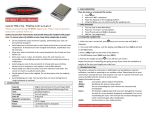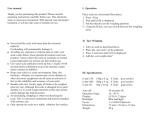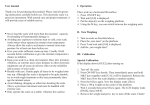Transcript
US-SONIC- User Manual Capacity: 500g x 0.1g - Weighing modes: g, oz, gn, dwt Thank you for purchasing US-SONIC digital pocket scale. Please read all operation instructions carefully before use. Scales are precision instruments and should always be handled with proper care. To ensure years of reliable service, keep these simple tips in mind: Do not exceed the scales maximum capacity. Overloading your scale can permanently damage it! Avoid exposure to extreme heat or cold. Scales perform best at normal room temperature. If temperatures have changed dramatically, recalibration may be necessary. Allow your scale to warm up for 30-60 seconds before performing calibration (if available). Store your scale in a clean, dry location. Dust, dirt, and moisture can accumulate on the weighing sensors and electronics causing inaccuracy or malfunction. Avoid using you scale in close proximity to strong radio wave emitting devices such as computers, cash registers, and cordless phones. Always weigh on a flat level surface, free from vibrations and drafts. The corner of a room is usually the most stable. Gently apply all items to be weighed. Do not drop items onto the weighing platform. Avoid dropping your scale. The warranty does not cover damage due to rough treatment or overload. SCALE OPERATION Always weigh on a flat horizontal surface. Calibration may be required before weighing 1. Press [ON] to turn the scale on. 2. When power is turned on, all display segments appear on LCD for a few seconds and finally “0” will appear on the display. 3. Select the weighing unit with [MODE]. 4. Press [MODE] to select a weighing unit, eg. ‘‘g “,”oz’’,‘‘gn”,“dwt” Once the unit has been selected, the selected unit will be displayed to the weight value. Start weighing If you do not use a container for weighing, Verify the reading is “0”, if not, press [TARE] to display “0”. Place objects on the weighing platform to weigh. When the reading becomes stable, the stable weighing value is displayed. If you use a container for weighing, Place an empty container on the Platform Wait for the stability weighing value to be displayed and press [TARE] to display “0”. Place the objects to be weighed in the container. CALIBRATION When to calibrate Calibration may be required when it is initially installed, if the mini scale is moved to a substantial distance. This is necessary because the weight of a mass in one location is not necessarily the same in another location. Also, with time and use, mechanical deviations may occur. - Turn the scale on – display will show “0.0” - Press [CAL] button - Display will show 100.0g - Place 100g test weight - Display will show PASS. If PASS then calibration is complete /If FAIL then change batteries and repeat the above steps. The primary reasons for inaccuracy or malfunction are low batteries, incorrect calibration, overload or operating on an unstable surface. Please keep this in mind and maintain and operate your scale properly. The scale is a precise instrument and must be handled with the utmost care and caution. TROUBLESHOOTING Display Elimination of errors Nothing, Battery-Symbol,[1o] or [88888] Change the batteries. [RECAL] Recalibrate the scale as shown above. [EEEEE] You are overloading the scale. Remove the excessive load immediately! [LLLLL] The delicate weighing load cells have been damaged by misusing the scale (i.e. it was shocked, dropped or overloaded). You can try recalibrating the scale. If the load cell has not been damaged too much it will work again after recalibration. [UNST] Use the scale in a more stable position Tested to comply with FCC standards









